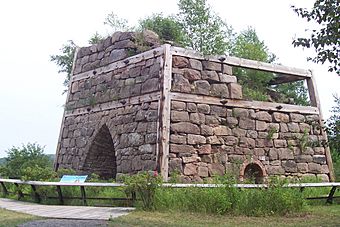Onota, Au Train Township, Michigan facts for kids
|
Bay Furnace
|
|

Reconstructed furnace
|
|
| Nearest city | Christmas, Michigan |
|---|---|
| Area | less than one acre |
| Built | 1869 |
| NRHP reference No. | 71000382 |
Quick facts for kids Significant dates |
|
| Added to NRHP | September 30, 1971 |
Onota was a small village in the Upper Peninsula of Michigan. It was located on Grand Island Bay, right by Lake Superior. Today, you can find the site of Onota within the Bay Furnace Campground and Picnic Area. The most important part left of the old village is the Bay Furnace. This was a special type of oven called a blast furnace, used to make iron. Bay Furnace is now a recognized historic site.
Contents
History of Onota and Bay Furnace
Onota was first used by Native Americans as a fishing spot. The first recorded settlement there began in 1869. This is when the Bay Furnace was built. It was a large furnace used to melt iron ore.
Making Iron at Bay Furnace
The Bay Furnace started making iron in the spring of 1870. It produced thousands of tons of iron each year. Ships would bring in raw materials like iron ore. Then, they would load the finished iron, called pig iron, onto ships at a long pier. This pier stretched about 1,400 feet (430 m) into Lake Superior.
To melt the iron, the furnace needed charcoal. This charcoal was made right in Onota. By 1874, the Bay Furnace Company had 52 charcoal ovens working. The main furnace, called Stack Number One, was making about fifteen tons of pig iron every day.
The Village and the Fire
By 1876, the Bay Furnace Company faced financial problems. The village of Onota grew around the furnace, with about 500 people living there. Most of these people worked for the furnace or helped support the iron industry.
However, in 1877, a big fire destroyed the town. It had been a dry season, and the woods around Onota were already burning. On May 31, a strong wind pushed the flames into the village. In just a few hours, Onota was ruined. The village was never rebuilt.
What's Left Today
After the fire, only parts of the furnace remained. Later, some of these ruins were rebuilt in their original spot. In 1948, the land where Onota once stood was given to the U.S. Forest Service. Today, it's a place for history and recreation.
Bay Furnace Stack Description
The main part of the Bay Furnace that remains is called Stack Number One. It was built from strong, layered stones. Originally, it stood 45 feet tall. Inside, it had a special area called the "bosh," which was about nine feet wide. This is where the iron ore would melt.
Stack Number Two was another furnace built later, but it was only used for about a year. Near the furnace, there were also two groups of six charcoal ovens. These ovens were important for making the fuel needed to melt the iron.
 | Georgia Louise Harris Brown |
 | Julian Abele |
 | Norma Merrick Sklarek |
 | William Sidney Pittman |



